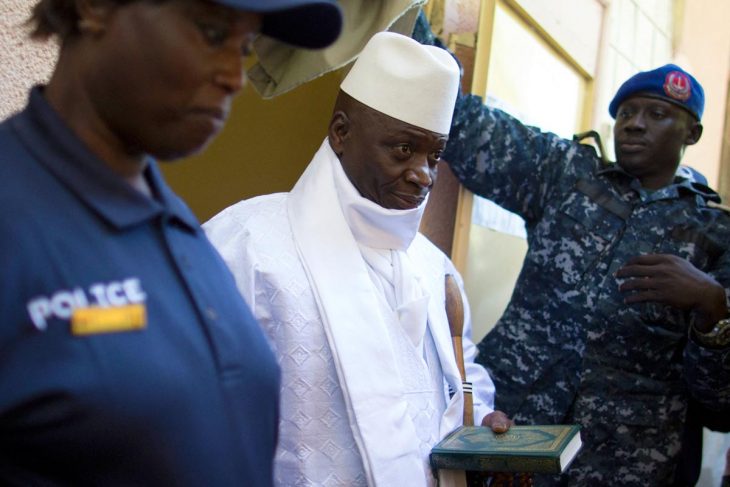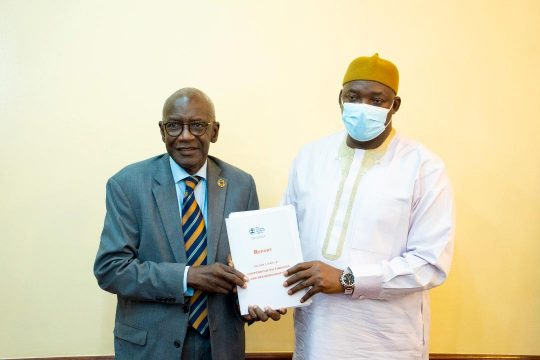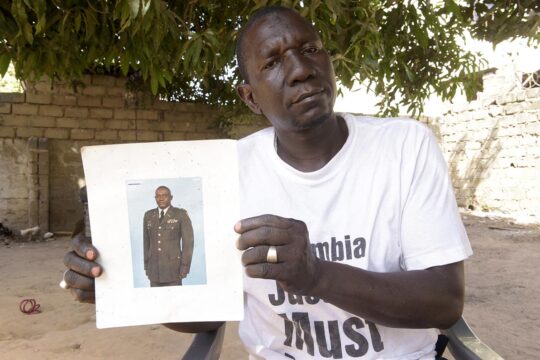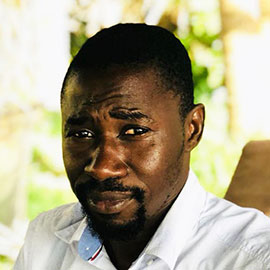Find the full final report of the Gambia TRRC at the bottom of this page.
Yahya Jammeh, the exiled former president of the Gambia, must be held accountable for the assassination of more than 200 people in his 22-year rule, says the country’s Truth, Reconciliation and Reparations Commission (TRRC) in its final report released on December 24. After two and a half years of hearings and investigations, it found that at least 240 persons were found to have been murdered by state agents under his rule.
Jammeh lost power to current president Adama Barrow in 2016, who was re-elected in December for a second term. His victims, according to the TRRC final report, range from people he perceived to be his security threats, political opponents, close associates he fell out with, ordinary citizens and journalists. The Commission recommends that the former president be prosecuted for murders, unlawful killings as well as the crimes of rape, torture and enforced disappearances that he is found to have committed “directly and indirectly” while in power.
“Of course, justice will take place,” said the country’s Justice Minister Dawda Jallow as he made the report public on December 24, barely two weeks after Barrow won the election by a comfortable margin. Copies of the report, which is available online, were also submitted to Gambia’s Parliament and to the United Nations Secretary General’s office.
How long before Jammeh is brought to justice?
After nearly three years of work, including public hearings, a series of delays and political hold-ups, the Commission submitted its report to president Barrow last month.
“Three hundred and ninety-three witnesses testified before the Commission, the majority of which were victims. The witnesses also included self-confessed perpetrators,” TRRC chair, Lamin J. Sise, said in a statement.
“After the powerful public testimonies at the TRRC which deeply impacted Gambians, there is an expectation and a demand, both at home and abroad, that the Gambian government will now deliver justice without further delay for victims. There is still a lot that needs to be done to get there, but I wouldn’t be surprised if we see Yahya Jammeh in a court sooner rather than later,” Reed Brody of the International Commission of Jurists, who advises Jammeh’s victims and was instrumental in the trial of former Chadian dictator Hissène Habré, told Justice Info.
2000-2010: the peak of killings
But before Jammeh, who still enjoys protection in exile in Equatorial Guinea, can be brought to justice, the priority for the Commission and for Gambia will be to organise the trial of all the other officials singled out in the final report. The long list includes his former vice president Isatou Njie Saidy, former Interior minister Ousman Sonko, former Defence Minister Edward Singhatey and former Local Government Minister Yankuba Touray.
For the many Gambians who followed the Truth Commission, the public hearings of the “Junglers” have no match in the degree of their grim violations. While the early life of Jammeh’s presidency was marred with violations, as noted by the Commission, the 2000s holds the record of rights violations. It was the time that the Junglers, a paramilitary group under his direct orders, were rampant.
Nearly 150 people were killed between 2000 and 2010. They include 17 student protesters, 66 West African migrants, journalist Deyda Hydara, 41 victims of Jammeh’s HIV treatment, 39 people killed during his witch-hunting exercise and people randomly killed by the Junglers. “Some survivors have remained in a despicable situation of health for decades,” said the Commission’s report.
The TRRC’s recommendations for prosecution include Junglers commander General Sulayman Badgie, five Junglers now in custody, over a dozen of Junglers on the loose, and former army chief Baboucarr Jatta. At one point, the group comprised at least 40 personnel drawn from the State Guards Unit of the army. However, at the time of the TRRC investigations, only six top members of the group were in custody.
… on Jammeh’s orders
“Defending Jammeh at all costs and carrying out his orders, irrespective of how wrong and unlawful they may be, was integral in the operational psyche of the Junglers,” said the Commission in its final report.
One of the Junglers’ early victims was prominent journalist Deyda Hydara, who was shot to death on December 13, 2004. The Commission said it was convinced by evidence that Hydaracaused great discomfort for his criticism of Jammeh through his newspaper and his campaign against anti-press freedom laws being instituted by the regime.
The largest single killing occurred barely one year after the murder of Deyda, when security forces rounded up 67 Europe-bound irregular migrants from various West African countries and surrendered them to Junglers, who killed all but one.
“Multiple witnesses testified that nothing in their appearance or behaviour suggested that they were more than migrants. The police officers who initially arrested them treated them as migrants and obtained their details. They were carrying small travel bags and it became obvious to the authorities that they were not mercenaries and not posing any threat to Gambia’s security,” said the Commission, which found that the orders came from Jammeh.
For this particular wave of killings documented by the Commission, it found Jammeh responsible for the crimes of rape, torture, and unlawful killing of student protesters and recommended his prosecution, along with his vice president Isatou Njie Saidy, his army chief Baboucarr Jatta and Interior Minister Ousman Badjie.
Also, several police and military officers have been recommended for prosecution or have been put on a list of people who should be banned from public office, including current head of the Anti-Crime Task Force, Gorgui Mboob.
… after a first decade of terror
During his first decade in office, Jammeh unleashed another form of terror on citizens. The former ruler embarked on a witch hunting exercise. At least 39 people were found by the Commission to have died during this period.
“Many survivors have been incapacitated and many are still suffering from physical and mental ailments as a result of the concoctions they drank and the terrible treatment meted out against them,” said the Commission. From 1994 to 1995, it found, Jammeh and his junta were involved in two high-profile murders.
On November 11, barely four months after taking over, Jammeh and his men responded to a counter-coup, killing at least 11 military personnel through extra-judicial means, while subjecting others to torture. This would later be known in Gambia as the November 11 incident. The Commission holds Jammeh and members of his junta responsible for it and asks the government to prosecute them. Also recommended for prosecution for these murders are Sanna B. Sabally, Defence Minister Edward Singhatey and army chief Jatta.
The second high-profile murder occurred on June 24, 1995. The charred remains of former Finance Minister Ousman Koro Ceesay were found inside his burnt official vehicle in an isolated location. The Commission indicated that Koro was killed “to silence him permanently because he was about to expose some unfavourable information about financial management by the Junta in the 1995/1996 Budget Speech. The Junta did not want this.”
The Commission thus held Jammeh, former Defence Minister Edward Singhatey, former Local Government Minister Yankuba Touray and Peter Singhatey—a brother of Edward who was an influential member of the Gambian armed forces—responsible for Ceesay’s murder and called for their prosecution, while recommending amnesty “for the low-level perpetrators such as Alagie Kanyi, BK Jatta, Pa Alieu Gomez” who testified to the crime committed. Touray is already serving a life sentence for murder of Ceesay.
Jammeh’s HIV herbal treatment
In 2007, Jammeh shocked the world when he announced that he had found a cure for HIV using herbs. For more than ten years, he administered the herbal concoction on patients.
The Commission said in its findings that the treatment was fake, fraudulent, and that it has endangered the lives of many people living with HIV/AIDS that participated in it, causing the death of at least 41 people. It recommends “the prosecution of Jammeh and Dr. Tamsir Mbowe for intentionally and knowingly causing the death of patients”.
The former ruler’s presidential convoy also claimed some lives, especially children who would gather around as Jammeh threw biscuits from his speeding convoys.
Sexual violence
The Commission’s findings reveal that besides killings, sexual violence was widespread throughout Jammeh’s 22-year rule. On his orders, security personnel, especially Junglers, raped and sexually harassed women.
“Sexual violence was often perpetrated either as the main objective of certain human rights violations or it was used as an instrument of repression, torture and punishment,” the Commission said. “Across the Gambia, females were disproportionately affected by violations including sexual violence, torture, inhumane and degrading treatment, arbitrary arrests, detention and forced labour,” it added.
One instance cited by the final report was when Jammeh instructed the Junglers to give “full treatment” to a woman whose identity has been protected by the Commission. And the Junglers raped her. His senior government officials, including senior security officials and government ministers were subjecting women and girls to a range of sexual violence with impunity, the report said.
The Commission further underlined in its report that there is evidence Jammeh himself raped a beauty contestant Fatou (Toufah) Jallow and protocol girls.
Amnesty applications being reviewed
As Justice Minister Jallow made the TRRC’s final report public last month, he announced that people who qualified for amnesty could apply. The Truth Commission, which is not yet dissolved, will now vet these amnesty applications.
“The applicant for amnesty should make a full and truthful statement in his or her application on their involvement in human rights violations as found by the TRRC in its report,” said the Commission in a statement issued on January 5. “In addition, the applicant must have expressed genuine remorse for their participation in human rights violations and abuses.” The applications for amnesty are open until January 21.
Will recommendations be followed?
Though the government assures there will be justice for Jammeh era crimes, critics of President Barrow doubt his commitment to justice. “I have no doubts that Barrow will not implement the TRRC recommendations in full. In a normal place, the right administrative and justice step to take immediately is to ask those adversely mentioned to step aside before the legal determination of their cases,” said leading Gambian rights activist Madi Jobarteh.
“There are a number of public officials and security officers who have been mentioned in the report for having committed human rights violations. Those officers should have been suspended immediately, both as a measure against any interference with justice and also to generate confidence in the public that there will be justice. Thus, the fact that Barrow has failed to do that until now shows his low-level commitment to justice. It appears Barrow is more focused on giving forgiveness in the name of a false notion of reconciliation than to ensure that there is accountability,” he added.
Barrow won his second term with a 53% margin in alliance with a faction of the Alliance for Patriotic Reorientation and Construction Party — a section of the party still loyal to former ruler Jammeh. And recently, one of the commanders of the state guards and Junglers, General Sulayman Badgie, has returned from Equatorial Guinea and is being lodged at a state-owned Friendship Hotel. Critics are asking why he was not arrested.
TRRC final report suggests judiciary options
The Commission has also offered recommendations of approaches that could be used to ensure Jammeh is brought to justice, in the Gambia or abroad. The first option is to establish a hybrid tribunal in the Gambia comprising of Gambians and other nationalities, like in the East Timor, Cambodia or Sierra Leone hybrid courts models.
Another option is to bring Jammeh and his henchmen to justice in a neighbouring country, in which Gambia could play a leading role. Such an approach was taken in the prosecution of Habré, who was prosecuted in Senegal for crimes he had committed in Chad.
“The numerous crimes committed by Yahya Jammeh and his co-perpetrators include unlawful killings, sexual violence, torture, enforced disappearance, persecution including through arbitrary arrests and unlawful detentions. Gambia being the state where the crimes have been committed, naturally (it) has primary jurisdiction,” the Commission said.
But “the crimes committed by Yahya Jammeh and his co-perpetrators were not only committed against Gambian nationals. Some of the victims are nationals of other West African States such as Ghana, Nigeria, Senegal, Ivory Coast and Togo. Each of these states whose citizens were killed in Gambia would also have jurisdiction under their domestic laws to prosecute Yahya Jammeh for those crimes committed against their citizens in Gambia.”
At the time of writing, despite requests from Justice Info, neither the Gambia Truth Commission nor the Ministry of Justice is able to provide a full list of the persons recommended for prosecution in the TRRC's final report.
FULL REPORT OF THE GAMBIA TRUTH, RECONCILIATION AND REPARATIONS COMMISSION (TRRC)
Click on the following links to view or download the documents (PDF).
- Volume 1: Compendium Part A
- Volume 1: Compendium Part B
- Volume 2: Soldiers With A Difference: The Armed Forces Provisions Ruling Council (AFPRC) Junta
- Volume 3: November 11th 1994 Coup Attempt
- Volume 4: The Unlawful Killing of Ousman Koro Ceesay (Former Minister of Finance and Trade)
- Volume 5: Attack on Religious Freedoms - Attack on Road Users
- Volume 6: April 10 & 11 Student Demonstrations
- Volume 7: Attack on the Media and Freedom of Expression - Attack on Political Opponents
- Volume 8: The Junglers (Unlawful Killings, Tortures and Other Human Rights Violations
- Volume 9: President's Alternative Treatment Program
- Volume 10: Sexual and Gender-Based Violence
- Volume 11: 2009 Witch-Hunt Exercise
- Volume 12: The Killing of West African Migrants - Enforced Disappearances
- Volume 13: Institutional Hearings: National Intelligence Agency (NIA)
- Volume 14: Institutional Hearings: The Gambia Prison Services
- Volume 15: Institutional Hearings: Justice Sector Entities
- Volume 16: Reparations & Reconciliation
- Portraits of Witnesses








